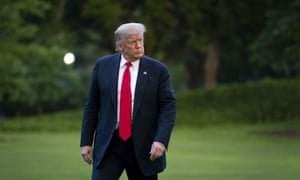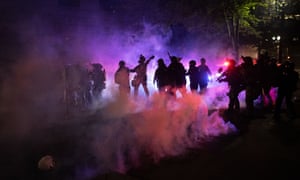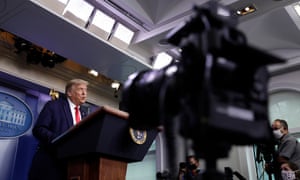Trump is facing a big election with an even bigger need for a political masterstroke – enter a surge of federal agents to fight supposed violence
Tom McCarthy
@TeeMcSee
THE GUARDIAN
Sat 25 Jul 2020

Donald Trump on the South Lawn of the White House on 25 June. Photograph: Drew Angerer/Getty Images
With an election looming and the polls looking bad, Donald Trump was in need of a quick political boost.
Seizing on television images of a procession of refugees out of Honduras, the president announced an imminent “invasion” of the United States by a “migrant caravan” and said he would deploy 15,000 military personnel to stop it. For weeks, Fox News blared “coverage” of the emergency.
Trump is unleashing authoritarianism on US cities – just in time for the election
Andrew Gawthorpe
Read more
That was in October 2018, and as a political strategy ahead of the midterm elections, the gambit utterly failed.
The Democrats flipped 40 seats in the House of Representatives the next month and racked up the largest popular vote margin in midterm elections history, on the highest turnout in 100 years. The “caravan” emergency was heard of no more.
Now two years later, Trump is facing an even bigger election, with an even bigger need for a political masterstroke if he is to win a second term in November.
Instead of deploying troops to the border to confront a made-up threat, Trump has announced “a surge of federal law enforcement into American communities” to fight a supposed cataclysm of violence born of a Democratic plot to undermine local police.
“To look at it from any standpoint, the effort to shut down policing in their own communities has led to a shocking explosion of shootings, killings, murders and heinous crimes of violence,” Trump said at the White House on Wednesday. “This bloodshed must end. This bloodshed will end.”
The deployment against anti-racism protesters is a ploy to burnish his strongman credentials, critics say – Trump is pursuing made-for-TV fascism, with the imposition of federal forces into US cities against the will of local authorities. As with 2018, the unmistakeable bogeyman is people of color, whom Trump portrays, with the help of conservative media, as again posing an existential threat to the country that only he can defend against.
With an election looming and the polls looking bad, Donald Trump was in need of a quick political boost.
Seizing on television images of a procession of refugees out of Honduras, the president announced an imminent “invasion” of the United States by a “migrant caravan” and said he would deploy 15,000 military personnel to stop it. For weeks, Fox News blared “coverage” of the emergency.
Trump is unleashing authoritarianism on US cities – just in time for the election
Andrew Gawthorpe
Read more
That was in October 2018, and as a political strategy ahead of the midterm elections, the gambit utterly failed.
The Democrats flipped 40 seats in the House of Representatives the next month and racked up the largest popular vote margin in midterm elections history, on the highest turnout in 100 years. The “caravan” emergency was heard of no more.
Now two years later, Trump is facing an even bigger election, with an even bigger need for a political masterstroke if he is to win a second term in November.
Instead of deploying troops to the border to confront a made-up threat, Trump has announced “a surge of federal law enforcement into American communities” to fight a supposed cataclysm of violence born of a Democratic plot to undermine local police.
“To look at it from any standpoint, the effort to shut down policing in their own communities has led to a shocking explosion of shootings, killings, murders and heinous crimes of violence,” Trump said at the White House on Wednesday. “This bloodshed must end. This bloodshed will end.”
The deployment against anti-racism protesters is a ploy to burnish his strongman credentials, critics say – Trump is pursuing made-for-TV fascism, with the imposition of federal forces into US cities against the will of local authorities. As with 2018, the unmistakeable bogeyman is people of color, whom Trump portrays, with the help of conservative media, as again posing an existential threat to the country that only he can defend against.

Federal agents fire teargas at protesters near the federal courthouse in Portland, Oregon, on 23 July. Photograph: Mike Logdson/RMV/Rex/Shutterstock
In some respects, the strategy has a long pedigree, going back to the 1968 “law and order” presidential campaigns of Richard Nixon and George Wallace, the Alabama segregationist. But there is a crucial difference between Trump’s foreign “invasion” charade of 2018 and his current domestic “crime explosion” ploy, analysts say.
Unlike the deployment of troops to a US border, the deployment of federal troops inside American cities threatens to fulfill its own fantasy, turning a dark and opportunistic fable spun by the White House into a daunting new reality in which violent clashes really do play out in the streets and unaccountable federal law enforcement officers really do round up and detain US citizens.
“What one has to ask is, how much is spectacle and how much is reality?” said Jason Stanley, a Yale philosophy professor and author of How Fascism Works. “Now, the spectacle should already worry us, because he did the spectacle in Lafayette Square,” Stanley said, referring to Trump’s violent clearance of peaceful protesters from a park near the White House in June.
What one has to ask is, how much is spectacle and how much is reality?Jason Stanley
“Then he did the spectacle in Portland. And when you allow too much spectacle, as it gets worse over time, people start to say, ‘This has been happening for awhile, what’s the big deal?’
“The spectacle normalizes, and then you can’t tell – say it’s November – you can’t tell if it’s still spectacle any more. It’s spectacle until someone gets hurt.”
Just how big of a spectacle the White House has planned for the run-up to the November elections is unknown.
In Portland, Oregon, unidentified federal officers have shot protesters and used unmarked vehicles to detain activists, and graffiti writers have been branded as “violent anarchists”. Trump plans to deploy troops from at least five federal agencies to Chicago and to Albuquerque, New Mexico, the justice department announced this week.
Multiple other cities including New York, Philadelphia, Detroit, Seattle, Baltimore, Oakland and Milwaukee have been named for potential future deployments, despite the unambiguous objections of those cities’ mayors.
“Unilaterally deploying these paramilitary-type forces into our cities is wholly inconsistent with our system of democracy and our most basic values,” more than a dozen mayors of major US cities warned Trump in an open letter last week.
Play Video
1:57 Portland protests: why Trump has sent in federal agents – video report
Trump is correct that some US cities have seen increases in gun violence in recent months, but crime in the US is down overall in 2020, and Trump is virtually alone in seeing a heavy-handed federal response as palliative.
Criminal justice experts have tied upticks in violence to the ravages of the coronavirus pandemic, which has now killed about 145,000 Americans; historic unemployment; social unrest following the murder of George Floyd in Minneapolis in May; seasonal fluctuations and other factors.
In any case, phalanxes of heavily armed officers descending on largely peaceful protesters risks sparking violence and unraveling months of work to establish community dialogue about police violence and racial injustice, the mayors have warned.
Julia Azari, a professor of political science at Marquette University, noted that crime is not currently a top issue of concern for a majority of US voters and said that the Trump campaign was working on a tenuous strategy of a narrow win through the electoral college.
“This has really never been a majority-focused administration,” Azari said. “In some ways it’s been an administration focused on mobilizing a particular segment of the American electorate, which is sort of strategically located throughout the states that are important in the electoral college.
“It’s a very uphill strategy.
”
Donald Trump speaks at a press briefing at the White House on 23 July. Photograph: Yuri Gripas/EPA
As a candidate, Trump can appear to be cornered. Polling indicates that Americans think Trump is wrong about the street protests, they disapprove of his performance as president overall by more than 55% on average, and they disapprove of his handling of the coronavirus pandemic specifically by a whopping 60%.
But Trump has been cornered in the past, as when he was supposed to lose in 2016. Then as now, Trump lashed out on race.
Talking about crime in big cities “can be dog whistles for racial divisions” to Trump supporters, especially in the midwest, who as a group are older, more white and more rural than the average US voter, Azari said.
But emphasizing chaos in the streets is a questionable strategy for an incumbent president, she said. “For most swing voters, the question comes down to, ‘Are things good, are things not good?’ And I don’t see this story as being a really compelling way to reframe the situation as like, ‘things are good’.”
For most swing voters, the question comes down to, ‘Are things good, are things not good?’Julia Azari
Even if Trump loses in November and is ushered off the national stage, his gestures in the direction of fascist politics – made-for-TV or not – will not be easy to erase, because Trump’s politics are merely a current expression of a 30-year Republican arc, said Stanley.
“There has been a long buildup before Trump,” Stanley said. “A core to authoritarianism – whether fascism or communism – is the one-party state. And Republicans for years before Trump, all the way back to [former House speaker] Newt Gingrich, who I blame all of this on, have been acting like their political opponents are traitors and not legitimate opponents.”
Stanley praised Joe Biden, Trump’s 2020 rival, for pursuing multi-party politics.
“What Biden’s doing is very impressive in that he is constantly – at first I criticized it – he is constantly talking about a return to a multi-party system, where we are going to prize the fact that we have different viewpoints, and that’s the core of our democracy.
“This idea that you can have people who differ and are Republicans or Democrats, and can have different views and can come together, is a repudiation of the Newt Gingrich-led attempt to undermine democracy and place Republicans in power by declaring the opposition party illegitimate.”

Donald Trump speaks at a press briefing at the White House on 23 July. Photograph: Yuri Gripas/EPA
As a candidate, Trump can appear to be cornered. Polling indicates that Americans think Trump is wrong about the street protests, they disapprove of his performance as president overall by more than 55% on average, and they disapprove of his handling of the coronavirus pandemic specifically by a whopping 60%.
But Trump has been cornered in the past, as when he was supposed to lose in 2016. Then as now, Trump lashed out on race.
Talking about crime in big cities “can be dog whistles for racial divisions” to Trump supporters, especially in the midwest, who as a group are older, more white and more rural than the average US voter, Azari said.
But emphasizing chaos in the streets is a questionable strategy for an incumbent president, she said. “For most swing voters, the question comes down to, ‘Are things good, are things not good?’ And I don’t see this story as being a really compelling way to reframe the situation as like, ‘things are good’.”
For most swing voters, the question comes down to, ‘Are things good, are things not good?’Julia Azari
Even if Trump loses in November and is ushered off the national stage, his gestures in the direction of fascist politics – made-for-TV or not – will not be easy to erase, because Trump’s politics are merely a current expression of a 30-year Republican arc, said Stanley.
“There has been a long buildup before Trump,” Stanley said. “A core to authoritarianism – whether fascism or communism – is the one-party state. And Republicans for years before Trump, all the way back to [former House speaker] Newt Gingrich, who I blame all of this on, have been acting like their political opponents are traitors and not legitimate opponents.”
Stanley praised Joe Biden, Trump’s 2020 rival, for pursuing multi-party politics.
“What Biden’s doing is very impressive in that he is constantly – at first I criticized it – he is constantly talking about a return to a multi-party system, where we are going to prize the fact that we have different viewpoints, and that’s the core of our democracy.
“This idea that you can have people who differ and are Republicans or Democrats, and can have different views and can come together, is a repudiation of the Newt Gingrich-led attempt to undermine democracy and place Republicans in power by declaring the opposition party illegitimate.”
No comments:
Post a Comment